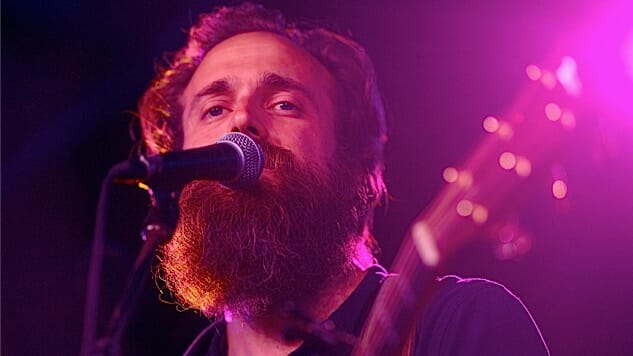Exclusive: Iron & Wine Finds His Voice on Beast Epic
After seven LPs, Sam Beam is finally comfortable with his voice and in his skin
Photo: Getty Images
Beast Epic sounds like Iron & Wine. It’s breezy and wistful, forward-looking and nostalgic. As singer/songwriter Sam Beam has pushed the boundaries of this project—from its humble lo-fi acoustic beginnings to its electric, brass and string-fueled jams of The Shepherd’s Dog and Ghost on Ghost—and explored collaborations with artists like Band of Horses’ Ben Bridwell and Jesca Hoop, Iron & Wine has circled back around to a happy resting place.
Beam has never seemed like one for resting, though. In fact, he feels like his sixth Iron & Wine release represents his strongest vocal effort, and refuses to let themes of growth and aging become stagnant. He chatted with Paste about the symbolism, honesty and existentialism found on Beast Epic.
Paste: To start with, I’m curious about the album artwork for Beast Epic, which is a kind of needlepoint depiction of you, blindfolded and strumming your guitar. Who stitched it? What’s the symbolism there?
Sam Beam: I wanted to do an embroidered album cover for a long time because I think they’re beautiful…[Originally] I had a couple of concepts. I wanted the duality between two figures. One of them is me with a guitar, blindfold, and bloody fingers like I’ve been working so hard. Beside me would be another me with a bunch of fish thrown over my shoulder, like Call of Duty, but I have a shotgun instead of a fishing pole. For some reason, those two together made me happy. Over the course of doing the thing, it was a question of making the message more approachable and more appropriate. Sara Barnes from Baltimore…has a blog called Brown Paper Bag. It’s an embroidery art blog…A lot of her work, she does it really small so when you photograph it, and it’s big, you can feel the texture. I like that stuff.
It’s been said that Beast Epic is your most honest album in a way, but it’s also been said that your earliest albums were really based around such confessional songwriting. Which kind of just makes me think that it’s all confessional, and it’s all honest, and it’s all personal. Why in particular are you calling this record your most revealing?
You never know if I’m 100% being confessional or not.
Way to be cagey.
I feel like, over the years with the songwriting, I’ve just followed whatever I was obsessed with at the moment. As you live a life, there are different things you’ll be going through in your life. I’ve been going through a more reflective time. You know, my kids are getting older. It sounds reductive to call it a midlife crisis record. As we get older, you enter different, reflective times. That’s what informed a lot of these songs. Sometimes the group of songs feels like it describes the world around you and how you feel about the world around you, reacting to the things and your obligations. Sometimes you’re looking inward and discovering yourself. That’s what this one was more about.
It seems like some of the characters in older songs, whether older versions of yourself or fictionalized, seem to look at the world from that mindset of growing up. With your daughters between 7 and 19 years old, do you see some of those themes that you wrote about reflecting in them, as if they’re almost living out some of your old songs?
Yeah, of course. Having kids, to me, is like looking in the mirror. You’re always constantly reminded of your own growing up and you can apply it to your art—whether you’re writing songs or painting or whatever you’re doing. You’re reminded of your own growing up, [including] some things that you had forgotten when you were a kid going through [them]. Hopefully, that’s how you experience it. At least, that’s how I experience it. I see everything in my life over and over again—not that watching them makes me think of myself—when you’re working on songs and you’re working on what you want to say in your life—not just your life, but life continuing.
-

-

-

-

-

-

-

-

-

-

-

-

-

-

-

-

-

-

-

-

-

-

-

-

-

-

-

-

-

-

-

-

-

-

-

-

-

-

-

-









































